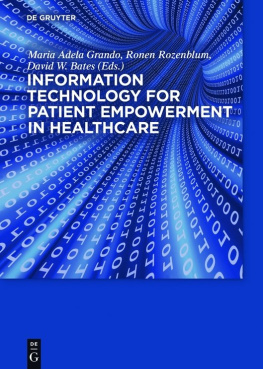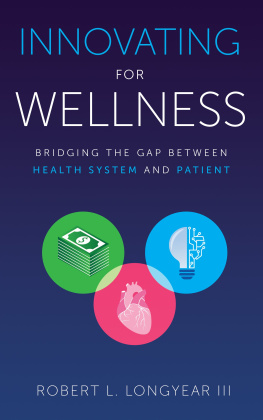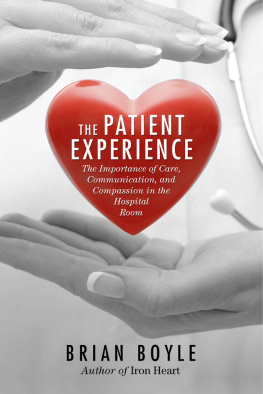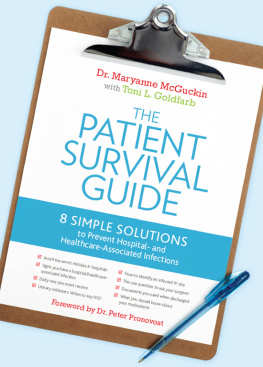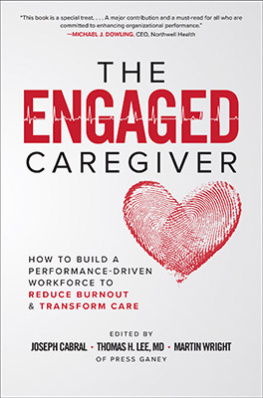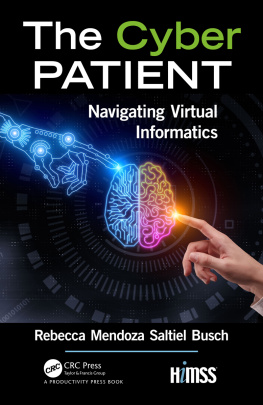Grando - Information Technology for Patient Empowerment in Healthcare
Here you can read online Grando - Information Technology for Patient Empowerment in Healthcare full text of the book (entire story) in english for free. Download pdf and epub, get meaning, cover and reviews about this ebook. year: 2015, publisher: De Gruyter, genre: Romance novel. Description of the work, (preface) as well as reviews are available. Best literature library LitArk.com created for fans of good reading and offers a wide selection of genres:
Romance novel
Science fiction
Adventure
Detective
Science
History
Home and family
Prose
Art
Politics
Computer
Non-fiction
Religion
Business
Children
Humor
Choose a favorite category and find really read worthwhile books. Enjoy immersion in the world of imagination, feel the emotions of the characters or learn something new for yourself, make an fascinating discovery.
- Book:Information Technology for Patient Empowerment in Healthcare
- Author:
- Publisher:De Gruyter
- Genre:
- Year:2015
- Rating:5 / 5
- Favourites:Add to favourites
- Your mark:
- 100
- 1
- 2
- 3
- 4
- 5
Information Technology for Patient Empowerment in Healthcare: summary, description and annotation
We offer to read an annotation, description, summary or preface (depends on what the author of the book "Information Technology for Patient Empowerment in Healthcare" wrote himself). If you haven't found the necessary information about the book — write in the comments, we will try to find it.
Grando: author's other books
Who wrote Information Technology for Patient Empowerment in Healthcare? Find out the surname, the name of the author of the book and a list of all author's works by series.
Information Technology for Patient Empowerment in Healthcare — read online for free the complete book (whole text) full work
Below is the text of the book, divided by pages. System saving the place of the last page read, allows you to conveniently read the book "Information Technology for Patient Empowerment in Healthcare" online for free, without having to search again every time where you left off. Put a bookmark, and you can go to the page where you finished reading at any time.
Font size:
Interval:
Bookmark:
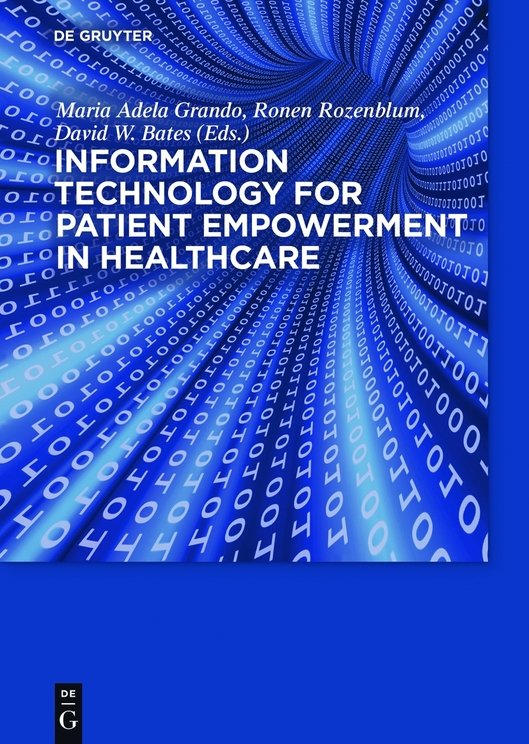
We are grateful to the many people who contributed to this book. First and foremost, we thank each of the 41 authors who contributed their valuable expertise and experience. We also thank our colleagues, Anita Murcko, David Kaufman, Bret Anderson, Conny Morrison and Christine Powers, for helping us review the chapters and for their ongoing support with the books preparation.
This book was inspired by the work of various organizations and people alongside whom we have worked to promote patient-centered care and patient empowerment. We are grateful to the Mayo Clinic for their support of our research on the development of technologies for patients. Mayo Clinic founders mission and value statement, the needs of the patient come first, has inspired and will keep inspiring our efforts to build technologies to empower patients. We also thank Brigham and Womens Hospital and Partners Healthcare, which have long been international leaders in HIT, and pioneers in patient computing. We thank the Gordon and Betty Moore Foundation for their support and funding, which has contributed significantly towards developing innovative health information technologies that are promoting patient engagement now at Brigham and Womens Hospital, as well as the other hospitals in the Libretto Consortium. Additionally, we would like to thank the Adult Congenital Heart Association for being a strong voice for patients and for their work towards increasing patient-centered care over the last few years. Their work has inspired us. We also thank the Patient-Centered Outcomes Research Institute (PCORI), the Agency for Healthcare Research and Quality (AHRQ), the Commonwealth Fund, the International Society of Quality in Health Care (IS Qua) and the American Medical Informatics Association (AMIA) for sponsoring research, facilitating its discussion, and for their thought leadership in this area.
Finally, we would like to dedicate this book to the patients whose experience we work so tirelessly to improve. It is a role that we all will one day assume and it is with that acknowledgement that we also thank all the individual people, patient advocates, professionals and organizations which promote patient-centered care, patient empowerment and patient engagement. Their commitment to enhancing these key domains of quality of care will make for a brighter future for us all.
Maria Adela Grando
Ronen Rozenblum
David W. Bates

Maria Adela Grando
Maria Adela Grando, PhD is an Assistant Professor at the Department of Biomedical Informatics at the Arizona State University and an Adjunct Assistant Professor of Medicine at the Mayo Clinic, College of Medicine. She has over 7 years of experience on applying methodologies from artificial intelligence for the development of information technologies to support clinical decision processes.
Dr. Grando holds a Master in Computer Science from Argentina, and a PhD in Formal Languages and Applications from Rovira i Virgili University (Spain). She completed two post-doctoral training research fellowships in Biomedical Informatics at the UK Cancer Research (Oxford University, Edinburgh University and the University College London) and at the Division of Biomedical Informatics at the University of California, San Diego.
Dr. Grandos research at UK Cancer Research was concentrated on building technologies to support the decision process of clinicians. However, in the last 4 years, she has shifted her research towards the deployment of tools to empower patients to make healthcare decisions. Dr. Grando has led multiple projects in the development of tablet-based electronic informed consent systems to engage and educate patients to make better informed decisions when deciding to participate in research studies. In particular, she has focused on building technologies to support patients desire to have granular control over sharing healthcare data for research. Currently, she is spearheading the development of several evidence-based smartphone applications to support behavioral change, including apps for engaging users on self-management activities to improve disease control, and apps for building family management skills to improve parent-children interactions.
Dr. Grando is an active member of the American Medical Informatics Association. She has authored more than 40 publications in the field of medical informatics, including articles in the leading journals in the field.

Ronen Rozenblum
Dr. Ronen Rozenblum is a researcher, lecturer and entrepreneur. He is the Founding Director of the Unit for Innovative Healthcare Practice & Technology and Director of Business Development of the Center for Patient Safety Research and Practice at Brigham and Womens Hospital in Boston. Dr. Rozenblum has a faculty appointment at Harvard Medical School where he is a health services researcher. He is an expert in patient-centered care, patient experience and engagement, and health information technology. His research, lectures, and contributions have been recognized nationally and internationally.
Dr. Rozenblum holds a Masters degree in Public Health (MPH) and a PhD in Business Administration, Health Management and Economics. In 2011, he completed his post-doctoral research fellowship in patient-centered care, patient experience, quality of care, and medical informatics at Harvard Medical School.
Dr. Rozenblum has a wide breadth of expertise and practical knowledge in developing innovative methods and information technologies to enhance patient-centered care, patient experience and engagement. He has trained many clinicians to implement these tools in clinical settings and has presented his work at numerous national and international conferences. He lectures on patient-centered care in a HarvardX course entitled Improving Global Health: Focusing on Quality and Safety at the Harvard School of Public Health. He is a member of the Patient Experience Strategy Committee at Brigham and Womens Hospital, the Medical Advisory Board of the Adult Congenital Heart Association in the U.S., the Abstract Committee of the International Society for Quality in Healthcare (ISQua) Conference and the Israeli National Patient Experience Survey Committee.
In addition to his academic pursuits, Dr. Rozenblum has been involved in establishing and managing startup companies in the healthcare industry and has considerable experience in business development and management of such entities.

David W. Bates
Dr. Bates is an internationally renowned expert in using information technology to improve clinical decision-making, patient safety, quality-of-care, cost-effectiveness, and outcomes assessment in medical practice. A practicing general internist, Dr. Bates is Chief Quality Officer at Brigham and Womens Hospital in Boston where he is also Chief of the Division of General Internal Medicine. He is a Professor of Medicine at Harvard Medical School, and a Professor of Health Policy and Management at the Harvard School of Public Health, where he co-directs the Program in Clinical Effectiveness. He also serves as Medical Director of Clinical and Quality Analysis for Partners HealthCare.
Font size:
Interval:
Bookmark:
Similar books «Information Technology for Patient Empowerment in Healthcare»
Look at similar books to Information Technology for Patient Empowerment in Healthcare. We have selected literature similar in name and meaning in the hope of providing readers with more options to find new, interesting, not yet read works.
Discussion, reviews of the book Information Technology for Patient Empowerment in Healthcare and just readers' own opinions. Leave your comments, write what you think about the work, its meaning or the main characters. Specify what exactly you liked and what you didn't like, and why you think so.

